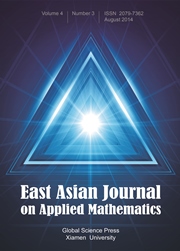Crossref Citations
This article has been cited by the following publications. This list is generated based on data provided by Crossref.
Biagi, Sofia
Misbah, Chaouqi
and
Politi, Paolo
2012.
Coarsening Scenarios in Unstable Crystal Growth.
Physical Review Letters,
Vol. 109,
Issue. 9,
Zhou, Peng
Wise, Steven
Li, Xiangrong
and
Lowengrub, John
2012.
Coarsening of elastically stressed, strongly anisotropic driven thin films.
Physical Review E,
Vol. 85,
Issue. 6,
Feng, Xinlong
Song, Huailing
Tang, Tao
and
Yang, Jiang
2013.
Nonlinear stability of the implicit-explicit methods for the Allen-Cahn equation.
Inverse Problems & Imaging,
Vol. 7,
Issue. 3,
p.
679.
Constantinescu, Adi
Golubović, Leonardo
and
Levandovsky, Artem
2013.
Beyond the Young-Laplace model for cluster growth during dewetting of thin films: Effective coarsening exponents and the role of long range dewetting interactions.
Physical Review E,
Vol. 88,
Issue. 3,
Biagi, Sofia
Misbah, Chaouqi
and
Politi, Paolo
2014.
Universality classes for unstable crystal growth.
Physical Review E,
Vol. 89,
Issue. 6,
Politi, Paolo
2015.
Coarsening dynamics at unstable crystal surfaces.
Comptes Rendus. Physique,
Vol. 16,
Issue. 3,
p.
280.
Feng, Xinlong
Tang, Tao
and
Yang, Jiang
2015.
Long Time Numerical Simulations for Phase-Field Problems Using $p$-Adaptive Spectral Deferred Correction Methods.
SIAM Journal on Scientific Computing,
Vol. 37,
Issue. 1,
p.
A271.
Qiao, Zhonghua
Tang, Tao
and
Xie, Hehu
2015.
Error Analysis of a Mixed Finite Element Method for the Molecular Beam Epitaxy Model.
SIAM Journal on Numerical Analysis,
Vol. 53,
Issue. 1,
p.
184.
Hashmi, Bahaudin
Shipman, Patrick D.
and
Bradley, R. Mark
2016.
Highly ordered square arrays of nanoscale pyramids produced by ion bombardment of a crystalline binary material.
Physical Review E,
Vol. 93,
Issue. 3,
Chen, Lizhen
Zhao, Jia
and
Yang, Xiaofeng
2018.
Regularized linear schemes for the molecular beam epitaxy model with slope selection.
Applied Numerical Mathematics,
Vol. 128,
Issue. ,
p.
139.
Chen, Yaoyao
Huang, Yunqing
and
Yi, Nianyu
2019.
A SCR-based error estimation and adaptive finite element method for the Allen–Cahn equation.
Computers & Mathematics with Applications,
Vol. 78,
Issue. 1,
p.
204.
Schneider, Joshua P
Margetis, Dionisios
Gibou, Frederic
and
Ratsch, Christian
2019.
An examination of scaling behavior in unstable epitaxial mound growth via kinetic Monte Carlo simulations.
Journal of Physics: Condensed Matter,
Vol. 31,
Issue. 36,
p.
365301.
Li, Congying
Huang, Yunqing
and
Yi, Nianyu
2019.
An unconditionally energy stable second order finite element method for solving the Allen–Cahn equation.
Journal of Computational and Applied Mathematics,
Vol. 353,
Issue. ,
p.
38.
Erb, Denise
de Schultz, Ricardo
Ilinov, Andrey
Nordlund, Kai
Bradley, R. Mark
and
Facsko, Stefan
2020.
Nanopatterning of the (001) surface of crystalline Ge by ion irradiation at off-normal incidence: Experiment and simulation.
Physical Review B,
Vol. 102,
Issue. 16,
Chen, Yaoyao
Huang, Yunqing
and
Yi, Nianyu
2020.
Recovery type a posteriori error estimation of adaptive finite element method for Allen–Cahn equation.
Journal of Computational and Applied Mathematics,
Vol. 369,
Issue. ,
p.
112574.
Erb, Denise J.
Myint, Peco
Evans-Lutterodt, Kenneth
Ludwig, Karl
and
Facsko, Stefan
2021.
In situ
GISAXS observation of ion-induced nanoscale pattern formation on crystalline Ge(001) in the reverse epitaxy regime.
Physical Review B,
Vol. 104,
Issue. 23,
Tan, Zengqiang
and
Zhang, Chengjian
2021.
The discrete maximum principle and energy stability of a new second-order difference scheme for Allen-Cahn equations.
Applied Numerical Mathematics,
Vol. 166,
Issue. ,
p.
227.
Bradley, R. Mark
and
Sharath, Tejas
2021.
Nanoscale pattern formation on solid surfaces bombarded by two broad ion beams in the regime in which sputtering is negligible.
Physical Review E,
Vol. 103,
Issue. 2,
Bradley, R. Mark
and
Sharath, Tejas
2021.
Theory of nanoscale surface ripple formation during oblique-incidence thin film deposition.
Journal of Applied Physics,
Vol. 129,
Issue. 17,
Tyrylgin, Aleksei
Chen, Yaoyao
Vasilyeva, Maria
and
Chung, Eric T.
2021.
Multiscale model reduction for the Allen–Cahn problem in perforated domains.
Journal of Computational and Applied Mathematics,
Vol. 381,
Issue. ,
p.
113010.

